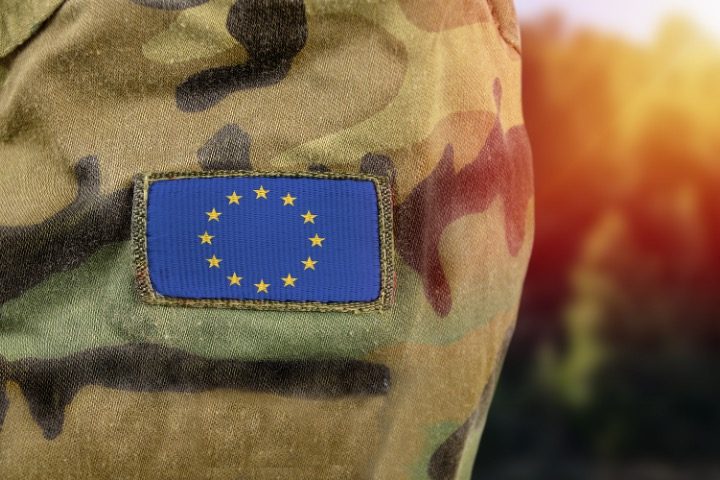
Italian Foreign Minister Antonio Tajani told Italy’s La Stampa newspaper on January 7 that European Union leaders should set up a common European army. Without a joint military, Tajani contended, the bloc cannot have a credible foreign policy. “If we want to be bearers of peace in the world, we need a European army,” Tajani claimed.
“This is a fundamental precondition for having an effective European foreign policy,” he posited, adding that in a world of “powerful players” like the United States, Russia, and China, European citizens “can only be protected by something that already exists, and it’s called the European Union.”
Some 22 EU states are presently members of NATO, with the U.S.-led pact effectively determining security policy in Europe since the start of the Cold War. Nonetheless, various EU leaders have suggested the notion of pooling their militaries into a common force without U.S. control in recent years.
French President Emmanuel Macron and former German Chancellor Angela Merkel were two of the most vocal advocates of this idea. Macron famously called NATO “brain dead” in 2019, and called on European leaders to adopt a policy of “strategic autonomy” from Washington.
In 2021, NATO Secretary-General Jens Stoltenberg cautioned that such a move away from the U.S. would “weaken the connection between North America and Europe.” When talk of an independent European army first surfaced 20 years earlier, then-U.S. Secretary of Defense William Cohen was more direct, lambasting the idea as “a threat to the very existence of NATO.”
The conflict in Ukraine has seemingly reduced discussion of European autonomy, and Macron has since altered his rhetoric on NATO and now backs the enlargement of the U.S.-led alliance. Merkel’s replacement, Olaf Scholz, still talks about the importance of “a more sovereign … European Union,” but has refrained from taking action toward what Merkel called “a real, true European army.”
NATO’s Eastern European members, on their end, have come out as the most vocal backers of the United States overseeing security in Europe. After Poland took a $2 billion loan from Washington to overhaul its military and welcomed the first permanent garrison of American troops to a base in Poznan, then-Defense Minister Mariusz Błaszczak stated in November that “any competition between [NATO] and the EU when it comes to security is a very bad thing,” and that Warsaw had opted for a close partnership with the U.S. over “some imaginary European army.”
Eventually, the EU approved the establishment of a common defense strategy last year, which enabled the setting up of a 5,000-strong “rapid deployment” force — falling considerably short of a common army.
In an interview with Die Zeit published on December 3 last year, former German Foreign Minister Joschka Fischer asserted that the EU has to get its own nuclear arsenal to better deter Russia. The now-retired official also cautioned that the alliance should be able to defend itself should its relations with the U.S. head south.
In November, Czech President Petr Pavel said that NATO regards Moscow as the biggest threat, with the U.S.-led military bloc preparing for a major conflict.
Pavel, who served as chairman of NATO’s Military Committee between 2015 and 2018, said that “all armies are preparing for the possibility of a high-intensity conflict” in Europe.
Top Russian officials, including President Vladimir Putin, have, in turn, repeatedly warned that they see NATO’s eastward expansion as undermining Russia’s security.
The former German foreign minister maintained that “we must restore our deterrence capability” following Russia’s actions in Ukraine. He also said that Europe cannot afford to permit Moscow to prevail in Ukraine, with the present conflict being of “crucial importance” to the Continent’s future.
Notably, Fischer played a key role in founding the German Green Party. In 1999, when he was Berlin’s top diplomat and the Green Party leader, he backed NATO’s bombing campaign against Yugoslavia. In 2011, he supported German troops’ intervention in Afghanistan.
When questioned by Die Zeit as to whether he thought that Germany should acquire nuclear weapons, the former politician replied in the negative, stating that it should be the EU instead. Furthermore, he suggested that France’s and Britain’s nuclear arsenals were no longer sufficient to ensure European security.
When the interviewer reminded Fischer that he and his party vehemently opposed nuclear weapons back in the 1980s, the former minister replied that the “world has changed” since then. He went on to point out that while he hopes that U.S.-EU relations will remain as close as they are now, such a situation could change, especially if former President Donald Trump is reelected in 2024.
Apart from nuclear deterrence, Europe should focus on ramping up its air defenses, Fischer told Die Zeit.
In late October, Russian Foreign Minister Sergey Lavrov said that NATO’s nuclear-sharing scheme, under which part of the U.S. nuclear arsenal is based outside the country, creates “increased strategic risks.” The diplomat went on to highlight that these developments forced Moscow to “resort to compensatory measures amid the general increase of threats posed by NATO.” Multiple U.S. nuclear bombs are reportedly stored in Germany, Italy, Belgium, the Netherlands, and Turkey.
Russian officials have constantly said that Moscow has no plans to attack NATO. However, Moscow has for years regarded the EU’s expansion toward its borders as a major threat, with Putin naming Ukraine’s potential accession to NATO membership as one of the key reasons for launching Russia’s military operation against Kyiv in February 2022.
In an interview published by the Izvestia newspaper in November last year, Russian Deputy Foreign Minister Sergey Ryabkov stated that the collapse of Russo-U.S. ties makes renewing a bilateral nuclear arms reduction accord with the U.S. nearly impossible. With the last of such treaties likely to expire, a possible arms race could result, he predicted.
New START, one example of agreements limiting Moscow’s and Washington’s nuclear arsenals, was last renewed “as is” in January 2021, days after Joe Biden was inaugurated as U.S. president.
However, Moscow halted its participation in the agreement in February, citing U.S. involvement in the Ukraine conflict and Kyiv’s assaults on Russian air bases hosting strategic bombers.
At this point, there is “no option” to continue New START or replace it after it expires in February 2026, Ryabkov said.
“We have to take into account the level of hostility of our opponents and their reckless drive to pump the Kyiv regime with all kinds of weapons,” he explained, bemoaning the situation as “the opposite to what we’ve always aimed for.”
Ryabkov hinted that people in Washington may be looking for a new arms race, similar to the one that President Ronald Reagan sparked with the Strategic Defense Initiative. The former U.S. president’s proposal was to set up an advanced anti-ballistic missile system that could prevent a Soviet nuclear strike, hence putting the Soviet Union at risk of an undeterred U.S. assault.
The technologies needed for such a system were far from maturity, but the threat pressured Moscow to overextend military spending. If the Americans hope to repeat Reagan’s deception, they are wrong, Ryabkov said.
“We will not fall for provocations, which are a feature of American politics on the Russian track; we will guarantee our security,” he pledged, adding that Russia saw no need for any treaties on nuclear weapons with China, claiming that the two nations have reached a “perfect understanding on all issues.”
“What we have is enough, and we are happy with it,” he pointed out.
Previously, officials from the administration of President Donald Trump maintained that they wanted a trilateral agreement with Russia and China to substitute New START when they decided against renewing it.


